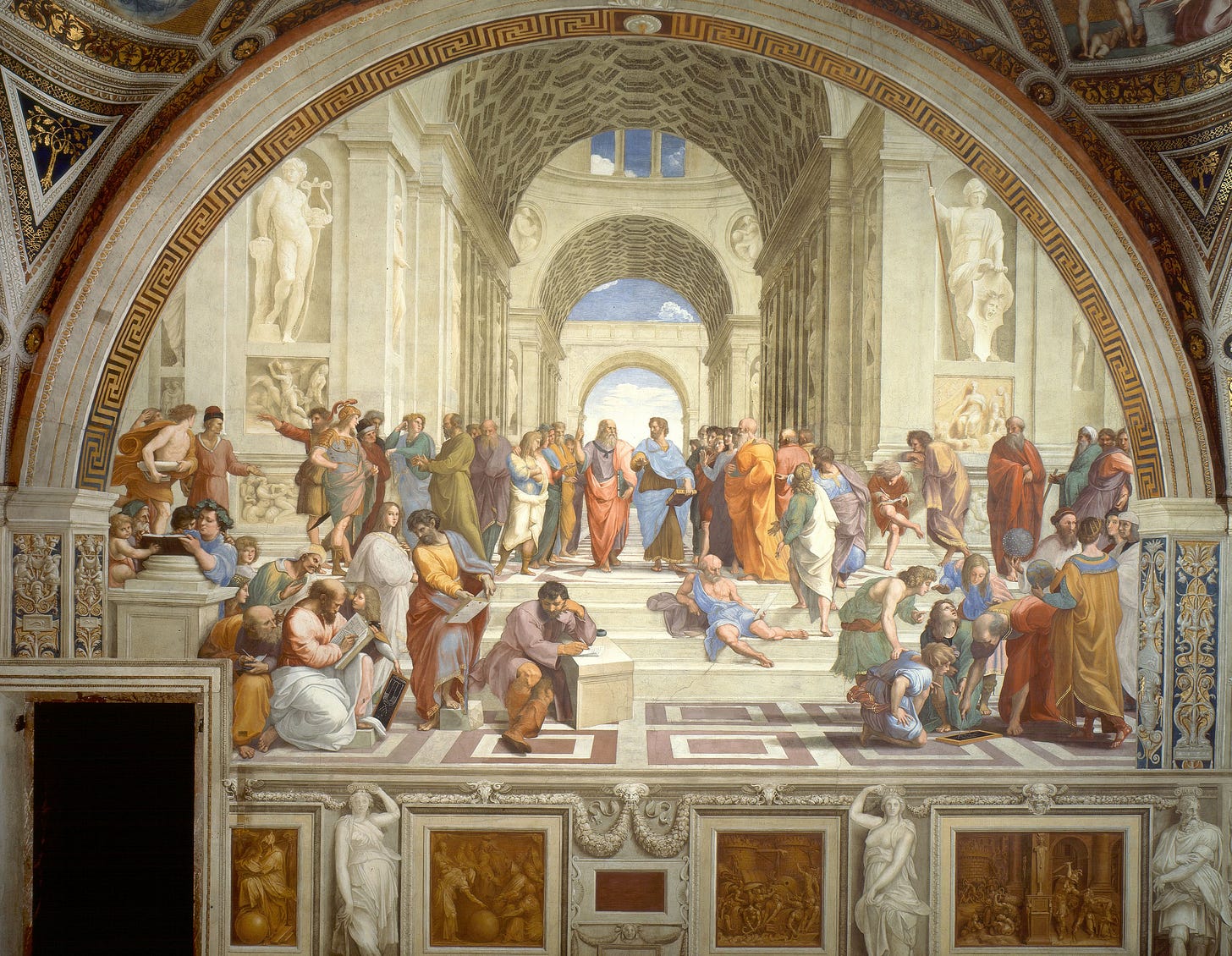Teaching with Primary Sources
Good schools and wise teachers will supplement their curriculum with pivotal primary source documents. I can help them.
My team and I are inching closer to launching a high school teaching program built on a curated collected of primary source documents. Big news is coming—stay tuned!
The program is divided into several subjects, or classes, one of which I’ve titled, “Philosophy In Their Own Words.” It’s a survey of classical, modern, and postmodern Western philosophy designed to prep teachers for better, deeper presentations to their students.
No shock here: In the collection of primary sources I’ve assembled, Plato’s Republic kicks things off. Alfred North Whitehead wasn’t entirely wrong, after all, when he suggested that the whole philosophic tradition has been “a series of footnotes to Plato.”
For a taste of what I’m crafting, here’s a sample from a tutorial prepared to help teachers leading a discussion with students about Plato’s Republic.
Education
Books II and III of The Republic tackle the question of how best to educate the guardians—the soldier class shielding the city Socrates, Glaucon, Adeimantus, and several other interlocutors are creating in speech.
They agree protection is important, so guardian lives matter. (Ever seen “Guardian Lives Matter” yard signs?) Educating guardians well also matters because they want the guardians to use their lethal fighting skills to protect and not harm fellow citizens.
In the Republic, Plato’s Socrates divides education into music and gymnastics: Education for the soul and training for the body.
The discussion about music quickly pivots to poetry—lyrics and tales shaping young guardians in their formative years. That leads to the highest subject about which poetry can offer instruction: God.
Divine Poetry
Socrates and the crew around him find Homer and Hesiod’s ancient poetry lacking—especially their godly yarns—and in need of a rewrite. Socrates argues that poetry should pin only good on God: God causes good, never bad. Bad people can do and cause bad things, but God is pure good—nothing but good—period.
Socrates pushes further: Poetry should present the best and most important things as unchanging, immutable, eternal. If God is the best and most important of all good and important things, then God must be unchanging, immutable, and therefore eternal.
Anything that is pure good—a thing that is perfect and cannot be improved—cannot change, lest the change would be for the worse. When a perfect being changes, it becomes imperfect.
In a decisive respect, therefore, God cannot be in time and space. God must be outside time and space. This is a kind of teaser for Socrates’ famous teaching about the ideas, or forms — which are not only eternal, they’re the ultimate reality — and the idea that comprehends all other ideas, the Idea of the Good.
(Many thinkers have noticed the curiosity that only one letter differentiates Good and God.)
One more tweak proposed by Socrates: the afterlife. Ancient poetic tales of Hades were scary, even terrifying. These dark accounts of the afterworld might make guardians reluctant to fight in defense of the city. Why risk death for a frightening fate following life?
Socrates wants poetry to paint a pleasant afterworld for those who live and die well. Guardians will be fearless, courageous, and likely to fight harder against enemies of the city if they believe rewards await them in an afterlife, or at least nothing terrifying.
Modern Rejection
Early modern thinkers like Machiavelli and Hobbes rejected the concept of an immediate afterworld presented as a place good people need not fear. They wanted to create a new, modern political science based on something reliable, something that could be universal and common to all human beings: Fear of violent death.
Modern theorists argued that fear of violent death would be a low but solid foundation for a new kind of regime — a new basis for political life — that offered mere security rather than aiming at human excellence or virtue.

Here’s the rub: The world Machiavelli, Hobbes, and other modern theorists witnessed was steeped in Christianity. And, there is much overlap in the Venn diagram of the Biblical account of Heaven and the poetic vision of Socrates: Heaven as God’s home; a welcoming, pleasant place and a reward for those who lived well during their time on Earth.
Machiavelli, Hobbes, and their ilk attacked the Christian concept of Heaven—indirectly and esoterically, but still attacked—because their philosophic-political project needed death to be terrifying, clashing with both Biblical hope and the poetry preferred by Socrates.
If early modern political theory had a motto, it might have been: Make Death Scary Again
Supplementing Textbooks With Primary Source
This discussion—this debate—spans not merely decades or centuries, but millennia, and features heavy hitters of philosophy and theology. That’s why a good school and wise teachers will supplement their curriculum not only with the history of philosophy, but philosophy as presented within the primary sources the great minds have left behind—in their own words—to help us better understand our world today and how it came to be.







I can't wait for the curriculum. I need a high school to teach at. I've been reading the book, "America on Trial: A Defense of the Founding" by Robert Reilly, and he is following a similar path at the beginning of the book. First of all, why people leaned on mythology, then how the philosophers started changing the course with the idea of reason, and finally how Christianity was able to combine the idea of a God with the rational ideas of Socrates, Plato, etc. Very fascinating.
As you likely understand, Tom, you and I are in fundamental agreement on the importance of philosophy!
I discovered the knowledge that led to this understanding through reading Rand. Her fiction first, but then, seeking to understand the values of the various characters in her fiction, her body of work on philosophy. Her metaphysics, epistemology, morality, politics, and esthetics - particularly her ESSENTIAL INSIGHT(s) on morality!
From what I have thus far discovered, she is the first philosopher who has provided a moral defense for the political ideas we share. A rational moral defense of Jefferson's "right to life, liberty, and pursuit of happiness."
Keep up the good, needed, and unflinchingly NECESSARY work! If there is anything I might do to help in that regard, please let me know.